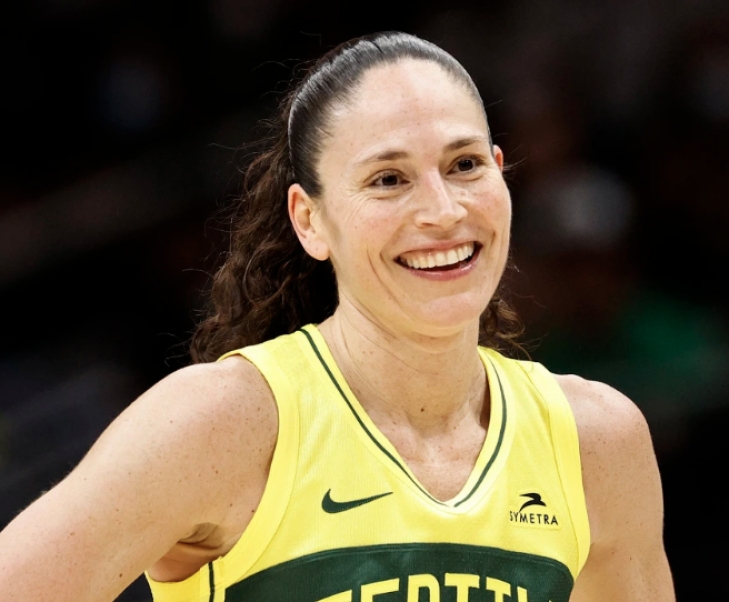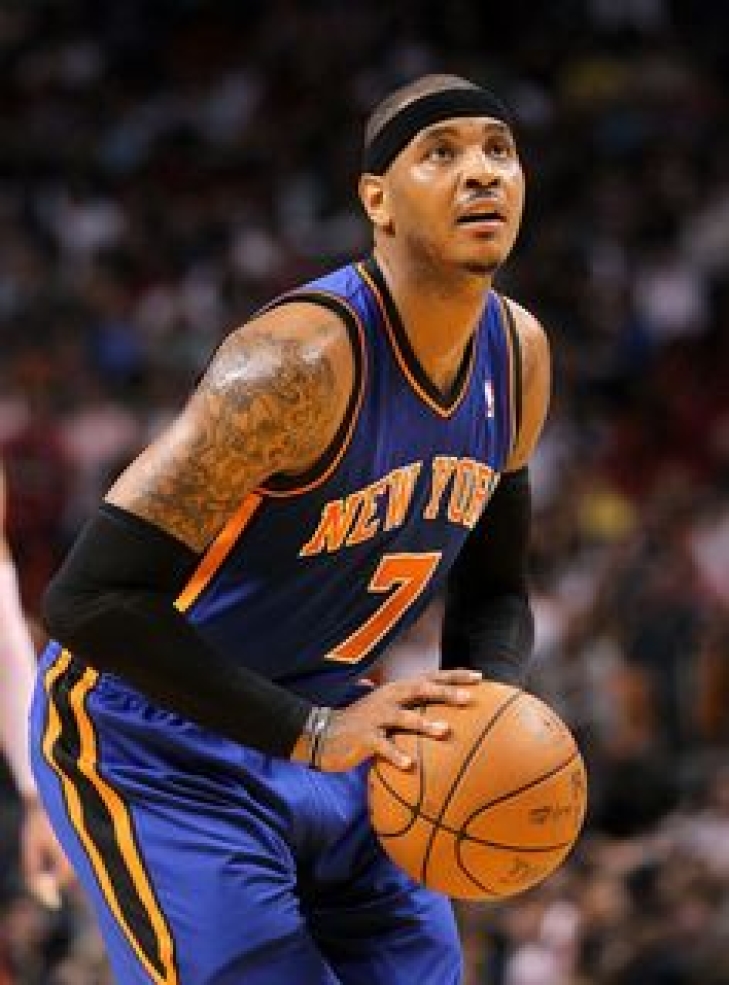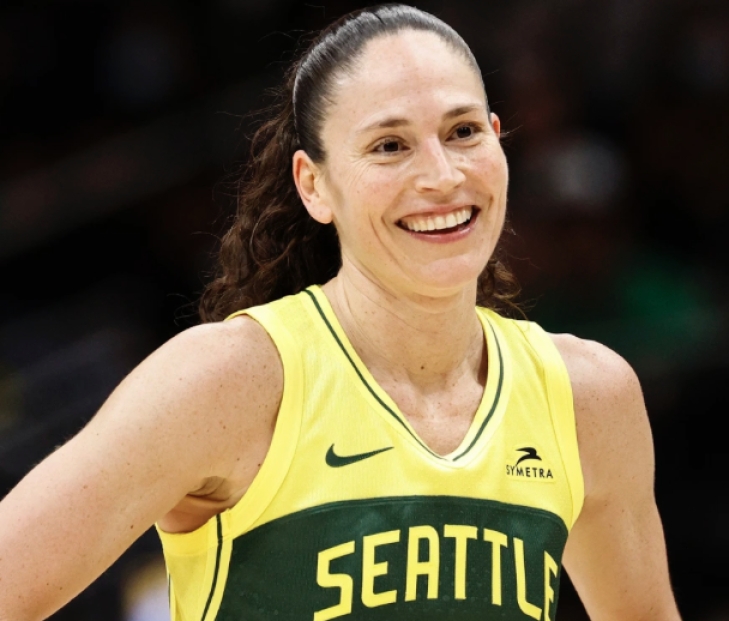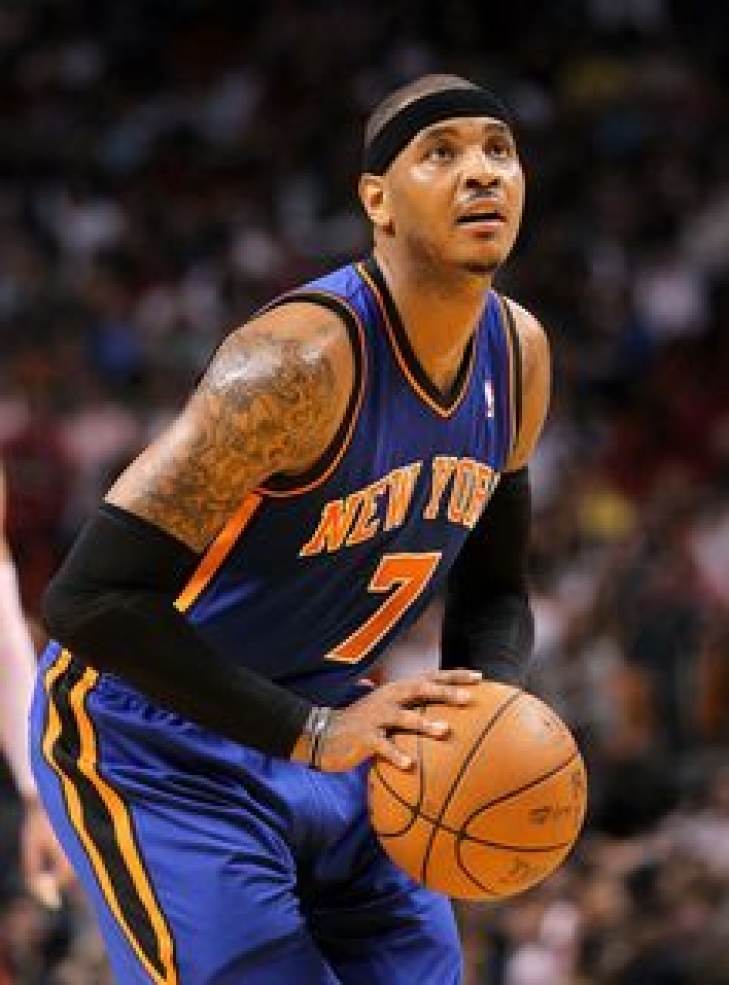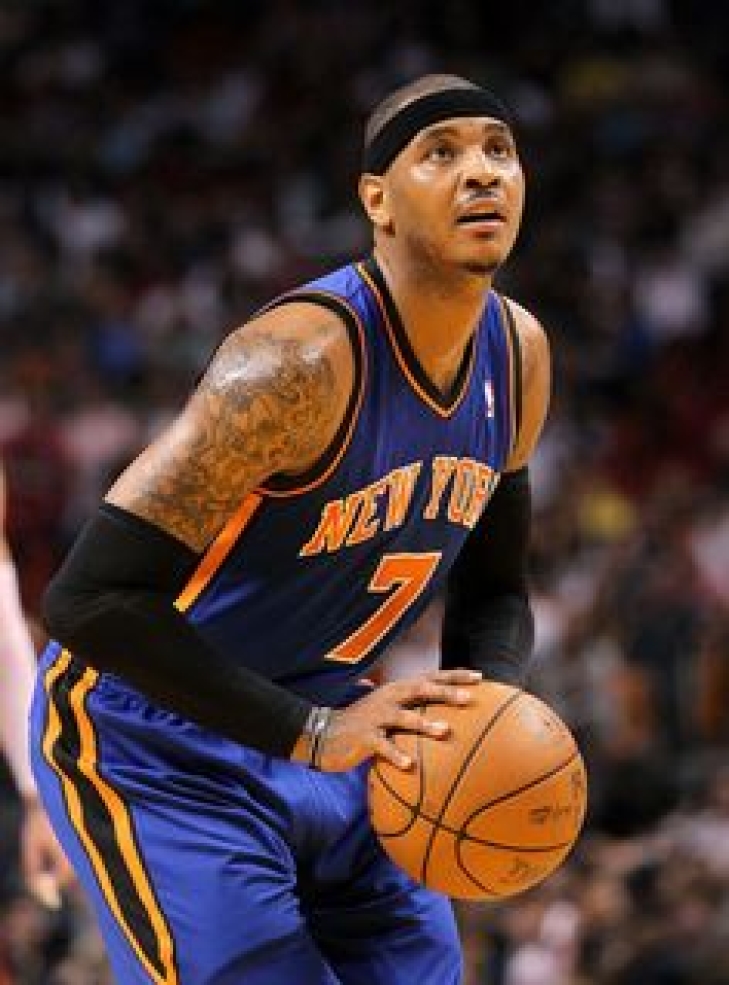The Naismith Basketball Hall of Fame announces the Class of 2025
While most basketball fans are excited about the Final Four, this is secondary to us to the announcement of the annual Naismith Basketball Hall of Fame Class.
This year’s announcement was altered when the Hall announced three months ago that they reduces the waiting period from three years to two, which allowed Carmelo Anthony, Dwight Howard and Sue Bird to be eligible this year. As expected, all three of them were elected.
Here is the complete list of the Naismith Basketball Hall of Fame Class of 2025.
2008 United States Olympic Team (TEA). Coached by Mike Krzyzewski (with Jim Boeheim, Nate McMillan, and Mike D’Antoni), the “Redeem Team” beat Spain in the finals. The roster included Carlos Boozer, Jason Kidd, LeBron James, Deron Williams, Michael Redd, Dwayne Wade, Kobe Bryant, Dwight Howard, Chris Bosh, Chris Paul, Tayshaun Prince, and Carmelo Anthony. They overall had a perfect 8-0 record and had an average victory margin of 27.8 Points.
Danny Crawford (REF). Crawford was an NBA Referee from 1984 to 2017 and worked 23 straight NBA Finals, and over 2,000 Regular Season Games. He also officiated multiple NBA All-Star Games.
Sue Bird (PLA). Bird is one of the best women’s players of all time, boasting the best resume among all candidates regardless of category. A former Naismith College Player of the Year at UConn and two-time NCAA Champion, Bird played her entire WNBA career with Seattle where she won four WNBA Titles, was a 13-time All-Star, five-time All-WNBA First Team selection, and for the United States won five Gold Medals (2004, 2008, 2012, 2016 & 2020) and four World Championships (2002, 2010, 2014 & 2018).
Maya Moore (PLA). After a solid career at UConn, Moore had an incredible pro career with the Minnesota Lynx, where she won four WNBA Titles, was the 2014 WNBA MVP, and was a six-time WNBA All-Star. As a one-time WNBA Scoring and Steals Champion, Moore also won two Olympic Gold medals and two World Championship Gold Medals.
Billy Donovan (COA). Currently the Head Coach of the Chicago Bulls, Donovan’s Hall of Fame path lies in the University of Florida, where he took the Gators to four SEC Tournament Championships, four Final Fours, and two NCAA Championships (2006 & 2007). The three-time SEC Coach of the Year also had stints as the Marshall Head Coach and Oklahoma City Thunder HC.
Dwight Howard (PLA). Howard was a three-time Defensive Player of the Year, an eight-time All-Star, and a five-time First Team All-Star, most of which were accolades from his early years in Orlando. He played for the Lakers thrice, winning his only title there in 2020. Howard also played for Houston, Atlanta, Charlotte, Washington, and Philadelphia, boasting five Rebounds Titles, two Blocks Titles, and an Olympic Gold Medal in 2008.
Micky Arison: Arison bought the Miami Heat in 1995, and under his ownership, the Heat won three NBA Championships (2006, 2012 & 2013).
Sylvia Fowles (PLA). One of the finest defensive players in WNBA history, Fowles split her professional North American career with the Chicago Sky and Minnesota Lynx, the latter of which she won two WNBA Championships and Finals MVPs (2015 & 2017). A WNBA MVP in 2017, Fowles won four Defensive Player of the Year Awards, an eight-time All-Star, and a three-time First Team All-WNBA Selection. Internationally, she won four Gold Medals (2008, 2012, 2016 & 2020) and a World Championship (2010).
Carmelo Anthony (PLA). A member of the NBA 75th Anniversary Team, Anthony led Syracuse to a National Championship in 2003 and would become a ten-time All-Star and a six-time All-NBA player (two Second Team and three Third Team). Melo is also a former NBA scoring champion who compiled 28,289 career Points and internationally is a three-time Olympic Gold Medal winner (2008, 2012 & 2016). He played for Denver, New York, Oklahoma City, Houston, Portland, and the Los Angeles Lakers.
The Hall also previously announced that Adrian Wojnarowski won the 2025 Curt Gowdy Insight Award, George Blaha and Clark Kellogg won the 2025 Curt Gowdy Electronic Award, Michelle Smith won the 2025 Curt Gowdy Print Media Award and Jeff Twiss won the 2025 John Bunn Lifetime Achievement Award.
We here at notinhalloffame.com would like to extend our congratulations to newest members of the Naismith Basketball Hall of Fame.
Carmelo Anthony to be elected to the Naismith Basketball Hall of Fame
This was no surprise.
Days before the official announcement of the Naismith Basketball Class of 2025, it has been leaked that Carmelo Anthony will be a part of this year’s class.
Anthony led Syracuse to a National Championship in 2003, ands drafted third overall by the Denver Nuggets, where he blossomed into one of the premier scorers in the league. Traded to the New York Knicks where he had his best run (and most recognized), Anthony would overall make ten All-Star Games, earn six All-NBA nods and was chosen for the NBA 75th Anniversary Team. He also won the Scoring Title in 2012/13.
Months ago, the Naismith Basketball Hall announced that it reduced the waiting period for eligibility from three years to two, which allowed Anthony (as well as Sue Bird and Dwight Howard) to be eligible on 2025 as opposed to 2026.
Anthony was ranked #1 on the latest Notinhalloffame Basketball list. Following the complete Hall of Fame announcement, we will begin work on revising the list.
We will certainly be watching to see if any more leaks emerge before this weekend’s official announcement.
The Naismith Basketball Hall of Fame announces the 2025 Finalists
Hall of Fame season continues as on the eve of NBA All-Star Weekend, the Naismith Basketball Hall of Fame has announced the Finalists for the 2025 Class.
The Hall made waves when they recently altered (again) the requirements, moving the eligibility limits to two years from three years.
This altered the landscape, as their were no surefire entrant for this year’s class.
The Finalists are:
2008 United States Olympic Team (TEA). Coached by Mike Krzyzewski (with Jim Boeheim, Nate McMillan, and Mike D’Antoni), the United States beat Spain in the finals. The roster included Carlos Boozer, Jason Kidd, LeBron James, Deron Williams, Michael Redd, Dwayne Wade, Kobe Bryant, Dwight Howard, Chris Bosh, Chris Paul, Tayshaun Prince, and Carmelo Anthony.
Dusan Ivkovic (PLA). A FIBA Hall of Fame inductee, Ivkovic played ten seasons for Radnicki Belgrade in the Yugoslavian League. Although the Point Guard had a nice career and was nominated as a player, he had far more success as a coach at the club level and for Yugoslavia and Serbia, winning three EuroBasket Gold Medals and a FIBA World Gold Medal in 1990. Why wasn’t he nominated as a Coach?
Danny Crawford (REF). Crawford was an NBA Referee from 1984 to 2017 and worked 23 straight NBA Finals.
Marques Johnson (PLA). Johnson helped UCLA win the National Championship in 1975 and two years later, he was the National College Player of the Year. He was a six-time All-Star (five with Milwaukee and one with the Los Angeles Clippers) with three All-NBAs (one First Team and two Second Teams) and had nearly 14,000 career Points. Johnson is enshrined in the College Basketball Hall of Fame.
Molly Bolin (PLA). Bolin was one of the biggest stars of the Women’s Professional Basketball League in the late 70s, the first pro basketball league for women. She was a three-time league All-Star and was the Co-MVP in 1980.
Buck Williams (PLA). Williams won the 1982 Rookie of the Year Award and was a three-time All-Star in his time with the New Jersey Nets. He also player for Portland and New York and was a four-time All-Defensive Selection (two First Team and two Second Team) and had 16,784 career Points and 13,017 Rebounds.
Jennifer Azzi (PLA). Azzi was the Naismith Basketball Player of the Year in 1990, leading Stanford to a National Championship. She was also on the gold medal-winning 1996 Olympic Women’s Team and won two more gold medals at the FIBA World Championship (1990 & 1998). She was also inducted into the Women’s Basketball Hall of Fame and was a Naismith Basketball Finalist in 2023.
Mark Few (COA). Few are arguably the most important men in Gonzaga's history; as of this writing, he is still their head coach. He took the Bulldogs to two Final Fours (2017 & 2021) and won 19 WCC Tournaments. He is also a two-time Naismith Coach of the Year and 12-time WCC Coach of the Year.
Sue Bird (PLA). Bird is one of the best women’s players of all time, boasting the best resume among all candidates regardless of category. A former Naismith College Player of the Year at UConn and two-time NCAA Champion, Bird played her entire WNBA career with Seattle where she won four WNBA Titles, was a 13-time All-Star, five-time All-WNBA First Team selection, and for the United States won five Gold Medals (2004, 2008, 2012, 2016 & 2020) and four World Championships (2002, 2010, 2014 & 2018).
Maya Moore (PLA). After a solid career at UConn, Moore had an incredible pro career with the Minnesota Lynx, where she won four WNBA Titles, was the 2014 WNBA MVP, and was a six-time WNBA All-Star. As a one-time WNBA Scoring and Steals Champion, Moore also won two Olympic Gold medals and two World Championship Gold Medals.
Tal Brody. Brody played collegiately at Illinois, but after he competed at Maccabiah Games in Israel, he was asked to stay, which led to a successful career where he put Maccabi Tel Aviv and Israeli basketball on the map, which was the tagline he is known for.
Jerry Welsh (COA). Welsh was the Head Coach at SUNY Potsdam, where he had a record of 494-141 from 1968 to 1991 and won two National Championships in 1981 and 1986.
Billy Donovan (COA). Currently the Head Coach of the Chicago Bulls, Donovan’s Hall of Fame path lies in the University of Florida, where he took the Gators to four SEC Tournament Championships, four Final Fours, and two NCAA Championships (2006 & 2007). The three-time SEC Coach of the Year also had stints as the Marshall Head Coach and Oklahoma City Thunder HC.
Dwight Howard (PLA). Howard was a three-time Defensive Player of the Year, an eight-time All-Star, and a five-time First Team All-Star, most of which were accolades from his early years in Orlando. He played for the Lakers thrice, winning his only title there in 2020. Howard also played for Houston, Atlanta, Charlotte, Washington, and Philadelphia, boasting five Rebounds Titles, two Blocks Titles, and an Olympic Gold Medal in 2008.
Micky Arison: Arison bought the Miami Heat in 1995, and under his ownership, the Heat won three NBA Championships (2006, 2012 & 2013).
Sylvia Fowles (PLA). One of the finest defensive players in WNBA history, Fowles split her professional North American career with the Chicago Sky and Minnesota Lynx, the latter of which she won two WNBA Championships and Finals MVPs (2015 & 2017). A WNBA MVP in 2017, Fowles won four Defensive Player of the Year Awards, an eight-time All-Star, and a three-time First Team All-WNBA Selection. Internationally, she won four Gold Medals (2008, 2012, 2016 & 2020) and a World Championship (2010).
Carmelo Anthony (PLA). A member of the NBA 75th Anniversary Team, Anthony led Syracuse to a National Championship in 2003 and would become a ten-time All-Star and a six-time All-NBA player (two Second Team and three Third Team). Melo is also a former NBA scoring champion who compiled 28,289 career Points and internationally is a three-time Olympic Gold Medal winner (2008, 2012 & 2016). He played for Denver, New York, Oklahoma City, Houston, Portland, and the Los Angeles Lakers.
The Hall also announced that Adrian Wojnarowski won the 2025 Curt Gowdy Insight Award, George Blaha and Clark Kellogg won the 2025 Curt Gowdy Electronic Award, Michelle Smith won the 2025 Curt Gowdy Print Media Award and Jeff Twiss won the 2o25 John Bunn Lifetime Achievement Award.
The 2026 Basketball Futures are up
This March, we have been working diligently on adding to our futures section in the big four sports. We have our first update to share, with the addition of the 2026 Basketball Futures.
All of the names feature retired players who will first be Hall of Fame eligible for the Class of 2026. You can now vote and/or comment as to whether you believe these names are (or are not) Hall of Fame worthy.
The new names are:
Andre Iguodala: Iguodala was a four-time NBA Champion with the Golden State Warriors and was a Finals MVP. He was also an All-Star and was the Sixth Man of the Year once and twice.
Carmelo Anthony: Anthony led Syracuse to an NCAA Championship and was on three Olympic Gold Medal Teams for the United States. A ten-time All-Star, Melo had four Third Team All-NBA, two Second Team All-NBA selections, and won a Scoring Title.
Goran Dragic: A multi-time champion in Slovenia, Dragic won a EuroBasket Gold for his country. In the NBA, he was an All-Star, a Third Team All-NBA and Most Improved Player Award winner.
Hassan Whiteside: For a brief time, Whiteside was one of Miami’s best players and is a former Second Team All-Defensive Selection.
Joe Johnson: Johnson went to seven All-Star Games and was a Third Team All-NBA Selectee once. His best years were with Atlanta.
LaMarcus Aldridge: Aldridge went to seven All-Star Games and was at his best with the Portland Trail Blazers. He earned five All-NBA spots, two Second Team spots, and three Third Team spots.
Lou Williams: Williams twice won the Sixth Man of the Year Award and holds the record for the most Points off of the bench.
Paul Millsap: Millsap was a rebounding machine at Louisiana Tech and would become a four-time All-Star in the NBA.
Rajon Rondo: Rondo won an NBA Title with the Celtics early in his career and later with the Lakers, and he was also a four-time All-NBA Selection.
Trevor Ariza: Ariza played over 1,000 Games and won an NBA Championship with the Lakers in 2009.
You know what we want you to do!
Cast your votes, and offer your opinions!
As always, we here at Notinhalloffame.com thank you for your support!
1. Carmelo Anthony
The story of Carmelo Anthony is long and arguably complicated, but it should end with a Hall of Fame induction. Anthony was a one-and-done player in college, but he is one of the most impactful players in NCAA history. The Brooklyn native led Syracuse to the 2003 Championship, where he was named the Final Four's Most Outstanding Player. He was taken by the Denver Nuggets Third Overall in one of the most loaded drafts in history, which also included LeBron James, Dwyane Wade, and Chris Bosh.
Melo was an instant offensive sensation, averaging 21 Points per Game and beginning a streak of 13 consecutive seasons where he scored at least 20 per contest. He was the runner-up to LeBron for Rookie of the Year, but Denver had their top gun. Anthony earned his first All-NBA Selection (Third Team) in 2005-06 and broke the 26.5 mark. An All-Star for the first time in 2007, Anthony had his best scoring season (28.9 PPG) and again was Third Team All-NBA. Notably, he received MVP votes for the first time, finishing 15th. The next year, Anthony was 13th in MVP voting and added a second All-Star. Accolades continued to fall in Melo’s lap, with another Third Team honor in 2008-09. This was also the closest that Anthony came to an NBA Championship as Denver reached the Western Conference Finals, where they fell to the eventual champions, the Los Angeles Lakers. The Nuggets were good, and Anthony was great, but if you had told him or any fan that Melo was never going to reach another Conference Final, they would not have believed it. It was much the same in Denver in 2009-10. Anthony was sixth in MVP voting and was an All-Star again. For the first time, he was named a Second Team All-Star. However, the Nuggets reverted back to a first-round exit, and the team had a frustrated superstar. Anthony did not sign a contract extension, and it was clear he wanted out and knew where he wanted to go: Home.
During the 2010-11 Season, Denver traded Anthony to the New York Knicks, and he was there to bring them a title. His popularity and profile rose, and though they were swept in the first round (Chauncey Billups and Amar’e Stoudamire were injured), it was believed that the best was yet to come. In Anthony’s second full season in New York, he won his first scoring title (28.7) was again a Second Team All-NBA player and finished third for the MVP, a career-high. They made it to the Second Round, but as much as it looked like they could build on it, this was Melo’s high-water mark with New York. Anthony was still a top scorer and going to All-Star Games (he went to ten in total), but the Knicks were not serious contenders, and he left his prime; his lack of defence was becoming a problem. New York could not build a team around him, and Anthony was not the player that elevated others. He was still regarded as one of the best, but the bloom was off the rose in Gotham. Anthony and Team President Phil Jackson were in constant conflict, and Anthony demanded a trade, which he obtained when he was dealt to Oklahoma City.
In OKC, Anthony was not the same player. Scoring was down, and the holes in his game grew wider. He became a journeyman, playing for Houston in 2019-19, but that lasted only 10 Games, and he had no suitors for the rest of the year. The Portland Trail Blazers signed him a year later, and he played well that season, arguably in a year that could be best described as a redemption tour. Anthony had two more seasons in the league, one more with Portland and another with the Los Angeles Lakers, retiring with an impressive 28,289 Points.
Anthony has the career numbers and the accolades of a Hall of Fame inductee, especially considering he was named to the 75th NBA Anniversary Team. While he did not win as a pro, remember he does own a College Championship and three Olympic Gold Medals. He is not the perfect HOF candidate, but there are a lot of warts in Springfield.
Carmelo Anthony Retires: HOF in 2026?
One of the most exciting basketball players of the last 20 years is calling it a career, as Carmelo Anthony, 39, announced his retirement.
Anthony was born in New York City, and would play one year collegiately for Syracuse in 2002-03, where he led the Orange to a National Championship. He was taken third overall that year in the NBA Draft (the most loaded class of all-time that also included LeBron James, Dwyane Wade and Chris Bosh) by the Denver Nuggets.
Melo did not take long to become a scoring machine in the Mile High City, averaging over 20 Points per Game as a rookie, and for the next 13 years, he never finished a season below that threshold. The Nuggets improved under Anthony, who went to four All-Star Games there, and took them to the 2009 Conference Finals.
Growing frustrated in Denver, Anthony sought a trade, preferably to New York, which was granted in February of 2011. Now the face of New York City basketball, Anthony had his best run, adding six more All-Star, and a Scoring Title (2012-13). The Knicks did not win a championship with Melo, but he was by far and wide their best player while he was there.
Anthony looked for a trade in 2017, which he got, to Oklahoma City, but his game went into a steep decline. He bounced over his final four years playing also for Houston, Portland and the Lakers, last playing in 2021-22.
While an NBA Title never came to fruition for Anthony, he does have three Olympic Gold Medals with the United States. He is also a member of the NBA 75th Anniversary Team, and was chosen for six All-NBA Teams (two Second, and four Third). Anthony leaves the game as the ninth-leading scorer (28, 289).
In our 2022-23 Pre-Season Hall of Fame Monitor of active players, Anthony was ranked at #13.
He is eligible for the Naismith Basketball Hall of Fame in 2026, where he should be a first-ballot entrant.
We here at Notinhalloffame.com would like to wish Carmelo Anthony the best in his post-playing career.
New Section up: We rank the top 50 Active Players in the NBA and their Hall of Fame Credentials
We here at Notinhalloffame.com are always looking to add new sections to our website. Last month, we uploaded our top 100 active NFL players and how their Hall of Fame resumes stack up.
We are doing the exact same thing with the NBA.
As opposed to 100 like we did in Football, we are going with only 50 in Basketball.
We liked the idea that we used in Football with a modern “Modern Positional Average”, so we are doing something similar here. With advanced analytics, we decided that we don’t have to isolate based on position so they are all on one list.
Inspired by Jay Jaffe’s JAWS statistic that looks at the best seven-year stretch of a baseball player according to bWAR, we are doing the same with current basketball players. Specifically, we compiled the average PER, Win Shares and VORP for each of the past Hall of Famers based on their best seven-year period. The additional thinking behind this is that in Basketball, there is an additional focus on periods of greatness as opposed to sports like Baseball, where compiling statistics is more glorified.
To keep everything modern, the average we used is the last 14 inductees, but only the ones who were Modern Era Inductees. This excludes Direct-Elect Candidates (contributors, Early African-American Pioneers, International and Veterans). The only exception is Vlade Divac, who was chosen via the International Committee, but has a healthy NBA career to draw upon.
As of this writing, the 14 players from the last four induction classes who we are using for the composite averages are:
Ray Allen, Maurice Cheeks, Vlade Divac, Bobby Jones, Grant Hill, Allen Iverson, Jason Kidd, Tracy McGrady, Yao Ming, Sidney Moncrief, Steve Nash, Shaquille O’Neal, Jack Sikma and Paul Westphal.
While we are not looking at traditional statistics, we are averaging out All-Star Games and All-NBA Selections. With the latter, we are looking at this in weighted fashion. In terms of Third Team All-NBA Selections, one point will be assigned, Second Team All-NBA Selections will have two points will be granted, and First Team All-NBA Selections will have three points.
Here are the averages:
Based on their elite seven-year stretch the average PER of the last 14 Modern Era Hall of Famers is 21.5.
Based on their elite seven-year stretch, the average Win Shares of the last 14 Modern Era Hall of Famers is 65.1.
Based on their elite seven-year stretch, the average VORP of the last 14 Modern Era Hall of Famers is 27.8.
With All-Star and All-NBA Selections, we look at the entire career of the player.
The average All-Star Selections of the last 14 Modern Era Hall of Famers is 7.4.
The average All-Pro Selections (based on the pointed average of one for a Third Team, two for a Second Team and three for a First Team Selection) is 9.8.
We are also adding NBA Championships. Often, players in this team sport more than any other (except for NFL Quarterbacks) are judged by the number of rings they have. Perhaps, that shouldn't be as regarded as it is, considering the average amount of titles of our last 14 Modern Era Hall of Famers is less than 1. Specifically, it is 0.79.
Wrapping this up in a bow, the six variables we are looking at Elite Period PER, Elite Period Win Shares, Elite Period VORP, All-Star Games, Weighted All-Pro Selections, NBA Championships.
This will be a regular feature on Notinhalloffame.com, and we will be updating this at the end of the season.
You can find our new section HERE.
As always, we here at Notinhalloffame.com thank all of you for your support!


